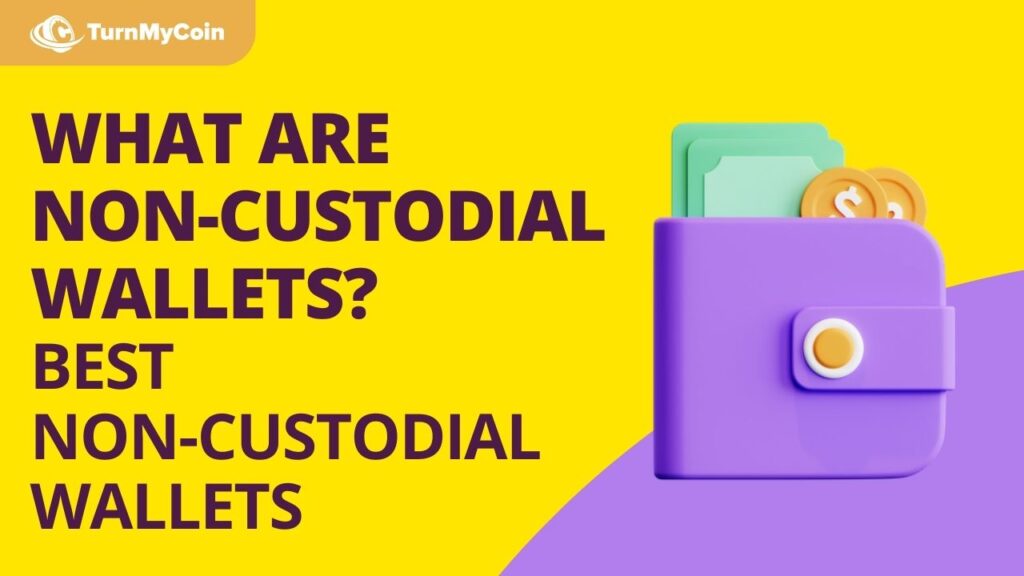Last updated on March 7th, 2023 at 11:58 am
Introduction
Cryptocurrency is a decentralized digital or virtual currency that uses cryptography for security. So it is not controlled by any central authority.
The need for secure storage of these digital assets has become increasingly important as the popularity of cryptocurrencies has grown.
One option for storing cryptocurrencies is the use of non-custodial wallets. We will read about the best non custodial wallets in a short while.
Non-custodial wallets differ from custodial wallets. The user holds the private keys to their own funds, rather than having them stored by a third party. This means that users have complete control over their funds and are responsible for their own security.
What is a Non Custodial wallet?
A non-custodial wallet is a type of cryptocurrency wallet where the user has complete control over their funds. This means that the user, and not the wallet provider, holds the private keys to their cryptocurrency.
This is in contrast to a custodial wallet, where the wallet provider holds the user’s private keys and has control over the user’s funds.
A non-custodial wallet user has full control over their funds and can access and transfer them at any time. This allows for greater security and peace of mind as the user does not have to trust a third party with their private keys and can avoid the potential risks associated with centralized wallet providers.
The non-custodial wallet gives the user the ability to make transactions directly on the blockchain. This means that the user can avoid the fees and potential censorship associated with using a centralized wallet provider.
Non-custodial wallets can come in many forms, including
- Hardware wallets (Ledger Nano X, Trezor Model T, Keepkey);
- Software wallets, and
- Paper wallets.
Hardware wallets are physical devices that securely store the user’s private keys and can be used to make transactions. From a security point of view, Hardware wallets are the best non custodial wallets on the market.
Software wallets are digital wallets that can be installed on a computer or mobile device and are often free to use.
Paper wallets are physical documents that contain the user’s private keys of a user.
What is a Custodial Wallet?
A custodial wallet is a type of cryptocurrency wallet where private keys are managed and stored by a third-party custodian, such as a cryptocurrency exchange (like KuCoin, Bybit, or Binance) or service provider.
This means that the user does not have direct control over their private keys and must trust the custodian to keep their funds secure. a custodial wallet is typically easier to set up and use than a non-custodial wallet.
Because the private keys are managed by the custodian, the user does not need to worry about securely storing them or losing access to their funds.
Additionally, many custodial wallet providers offer additional services, such as trading or the ability to easily move funds between different cryptocurrencies.
One of the main advantages of a custodial wallet is that it is typically easier to use and more convenient than a non-custodial wallet. Since the third-party service provider manages the private keys on behalf of the user, the user does not need to worry about securely storing their keys or understanding the technical details of how the wallet works.
This makes it a good option for beginners or for people who do not want to deal with the complexity of managing their own keys.
Another advantage of custodial wallets is that they often offer additional features and services that are not available with non-custodial wallets.
However, the main disadvantage of using a custodial wallet is that the user does not have complete control over their funds. If the custodian is hacked or goes out of business, the user may lose access to their funds. In addition, the custodian may have the ability to freeze or seize the user’s funds, if necessary.
10 Best Non Custodial Wallets
A non-custodial wallet is a type of cryptocurrency wallet where the user has complete control over their private keys. This means that the user is solely responsible for the security of their funds, as opposed to a custodial wallet where a third party holds the user’s private keys. In this article, we will be looking at the top non custodial wallets available on the market.
Best Non Custodial Wallets (Hardware Wallets)
1. Ledger Nano X

The Ledger Nano X is a hardware wallet that provides secure storage for your private keys. It features a large display and Bluetooth connectivity, making it easy to use on the go. The Nano X also supports a wide range of cryptocurrencies, including Bitcoin, Ethereum, and Litecoin.
2. Trezor Model T

The Trezor Model T is another popular hardware wallet that provides secure storage for your private keys. It has a large touchscreen for easy navigation, and it supports over 1000 cryptocurrencies.
3. KeepKey
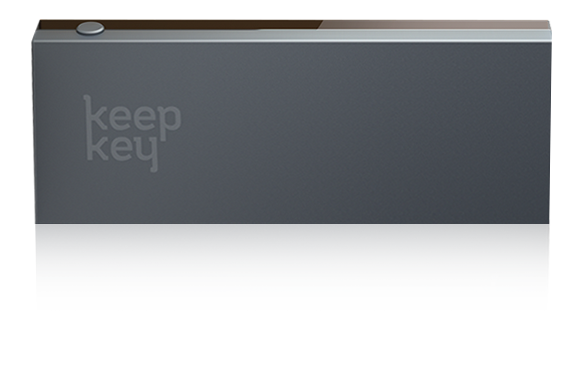
KeepKey is a simple and secure hardware wallet that provides easy backup and recovery for your private keys. It has a sleek design and supports a wide range of cryptocurrencies.
Best Non Custodial Wallets (Software Wallets)
4. Exodus
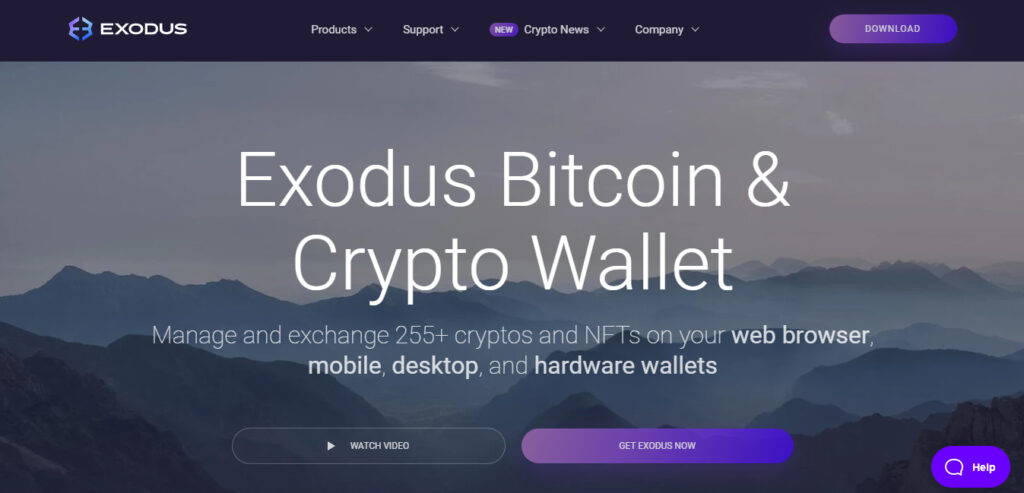
Exodus is a popular desktop wallet that offers a user-friendly interface and built-in exchange capabilities. It supports a wide range of cryptocurrencies and offers secure storage for your private keys.
5. Electrum
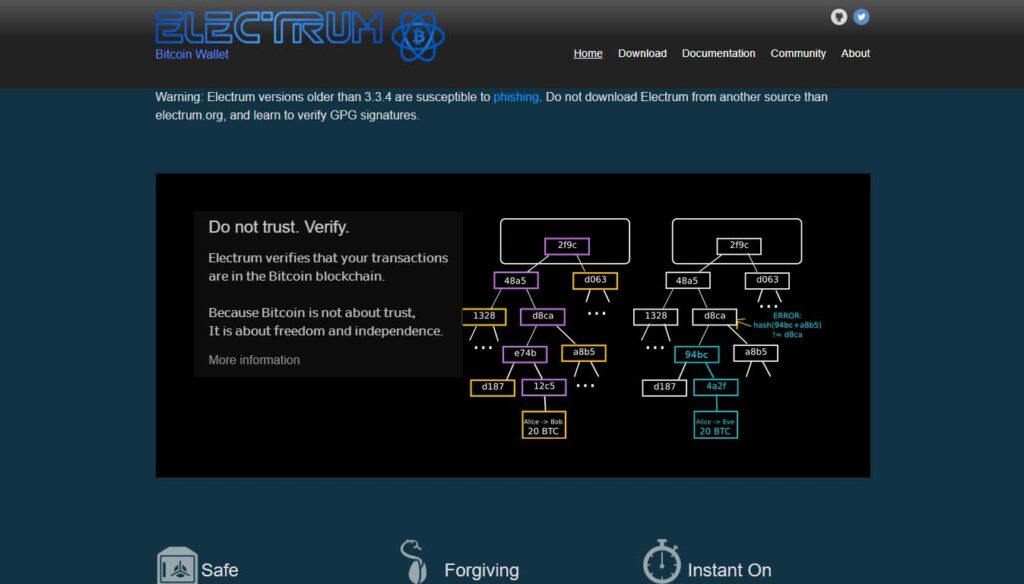
Electrum is a lightweight and secure desktop wallet that offers advanced features such as multisig support and hardware wallet integration. It supports a wide range of cryptocurrencies and offers secure storage for your private keys.
6. Mycelium

Mycelium is a mobile wallet that offers advanced features such as watch-only accounts and hardware wallet integration. It supports a wide range of cryptocurrencies and offers secure storage for your private keys.
7. Jaxx
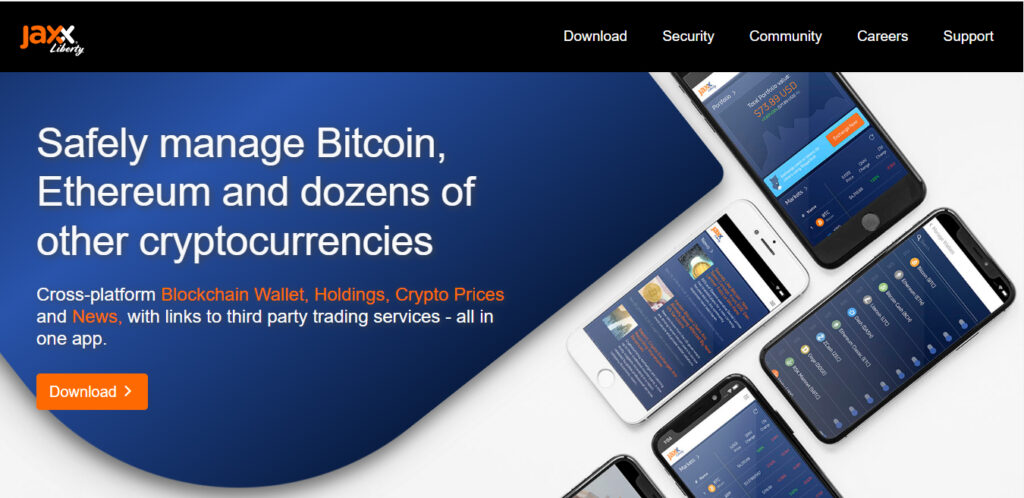
Jaxx is a popular mobile and desktop wallet that offers a user-friendly interface and built-in exchange capabilities. It supports a wide range of cryptocurrencies and offers secure storage for your private keys.
8. Blockchain Wallet

The Blockchain Wallet is a simple and secure mobile wallet that offers built-in exchange capabilities. It supports a wide range of cryptocurrencies and offers secure storage for your private keys.
9. Edge
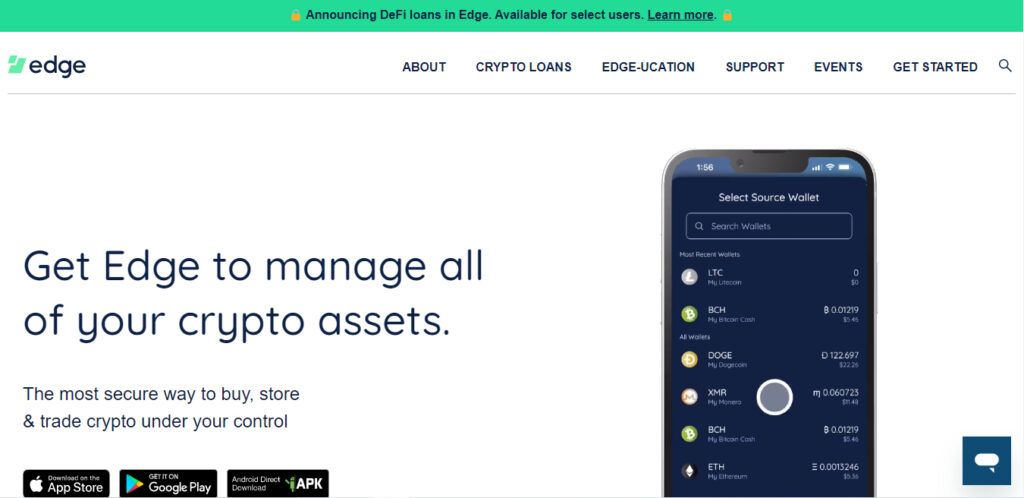
Edge is a mobile wallet that offers a user-friendly interface and built-in exchange capabilities. It supports a wide range of cryptocurrencies and offers secure storage for your private keys.
10. Trust Wallet
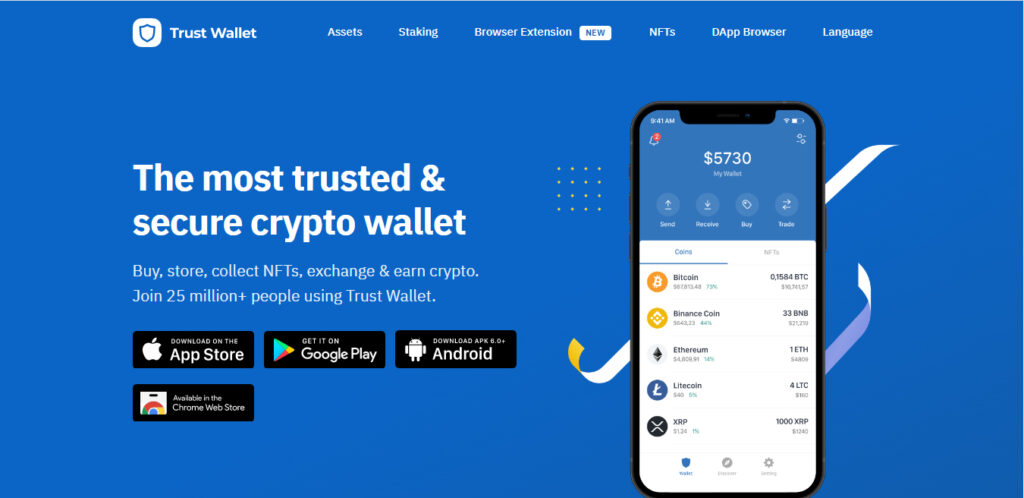
Trust Wallet is a simple and secure mobile wallet that supports a wide range of cryptocurrencies. It offers secure storage for your private keys and is designed to be easy to use.
The top non custodial wallets on the market offer a range of features and support a wide range of cryptocurrencies, making it easy for users to find a wallet that suits their needs.
Custodial Vs Non-Custodial Wallet
1. Custodian of the Private key
A custodial wallet is one in which the private keys are held by a third party, typically a cryptocurrency exchange or an online wallet provider.
In simple words, the third party is responsible for signing transactions on behalf of the user.
This means that the user must trust the third party to handle their funds securely and to only execute transactions that the user has authorized.
In a non-custodial wallet, the user holds their own private keys and is responsible for signing transactions themselves. This gives the user greater control over their funds and allows them to conduct transactions without relying on a third party.
Hence, the user is solely responsible for the security of their funds.
2. Security
When it comes to security, custodial wallets can be more vulnerable to theft or hacking. Since the third party has control over the private keys, a hacker who gains access to the third party’s systems could potentially steal the user’s funds.
This is a particular concern in the case of exchanges, which have been the target of numerous hacks and security breaches in the past.
In a non-custodial wallet, the user is responsible for protecting their own private keys, so the risk of theft is lower. However, if the user loses their private keys or forgets their password, they may permanently lose access to their funds.
There are a number of cases where people have forgotten their non custodial wallet password and have lost access to their $321 million of funds. Likewise another instance of a user losing $34 million again as they forgot the password.
While this can be more challenging for beginners, it also means that the user has complete control over their funds and does not need to trust a third party with their money.
Since the user is responsible for managing their own keys, they can choose to store their keys in a secure hardware wallet or use other security measures to protect their funds. This can provide an additional layer of security that is not available with custodial wallets.
4. Backup and recovery possibility
Another important difference between these two types of wallets is the ability to back up and recover funds.
In a custodial wallet, the third party typically provides a backup service that allows users to recover their funds if they lose access to their account. This can be a convenient feature, but it also means that the user must trust the third party to securely store their backup information.
In a non-custodial wallet, the user is responsible for securely backing up their own private keys and recovery information.
5. Offline accessibility
Finally, custodial and non-custodial wallets also differ in terms of offline accessibility. With a custodial wallet, the user typically does not have access to their private keys, so they cannot conduct transactions offline.
In a non-custodial wallet, the user holds their own private keys and can sign transactions offline, giving them greater flexibility and control over their funds.
What Are The Benefits And Problems With Non-custodial Wallets?
Let’s now get onto the benefits and shortcomings of Non custodial wallets.
Benefits of Non-Custodial Wallets
Though we have already iterated the benefits of best non custodial wallets while comparing them with custodial wallets. Here is a jist of their beneifts
- User Control – As mentioned earlier, the biggest advantage of non-custodial wallets is that they give users full control over their funds. This means that users have the ability to access and manage their funds without having to rely on a third party.
This is especially important for those who value their financial privacy and want to have complete control over their assets. - Security – Non-custodial wallets also offer a higher level of security than custodial wallets. Since users are in control of their own private keys, their funds are not at risk of being stolen by hackers or rogue employees of third-party company.
- Convenience – Non-custodial wallets are often easier to use than custodial wallets. They can be easily accessed from any device with an internet connection, and users can quickly and easily manage their funds without having to go through the hassle of setting up an account with a third party.
Limitations of Non-Custodial Wallets
- User Responsibility – The biggest limitation of non-custodial wallets is that users are solely responsible for the security of their funds. If a user loses their private keys or forgets their password, there is no way to recover their funds.
This can be a major disadvantage for those who are not comfortable with the idea of being solely responsible for their own funds. - Lack of Support – Another potential limitation of non-custodial wallets is the lack of support available. Since users are in complete control of their own funds, there is no third party to provide assistance if something goes wrong.
This can be frustrating for users who need help with their wallet or have questions about how to manage their funds. - Compatibility – Non-custodial wallets may not be compatible with all cryptocurrencies. Some cryptocurrencies may only be supported by specific non-custodial wallet providers, which can limit a user’s ability to manage their funds.
Conclusion
In conclusion, non-custodial wallets offer users a high level of control and security over their funds. However, this control also comes with the responsibility of managing their own funds and a lack of support if something goes wrong.
It is important for users to carefully consider the benefits and limitations of non-custodial wallets before deciding if they are the right option for them.
